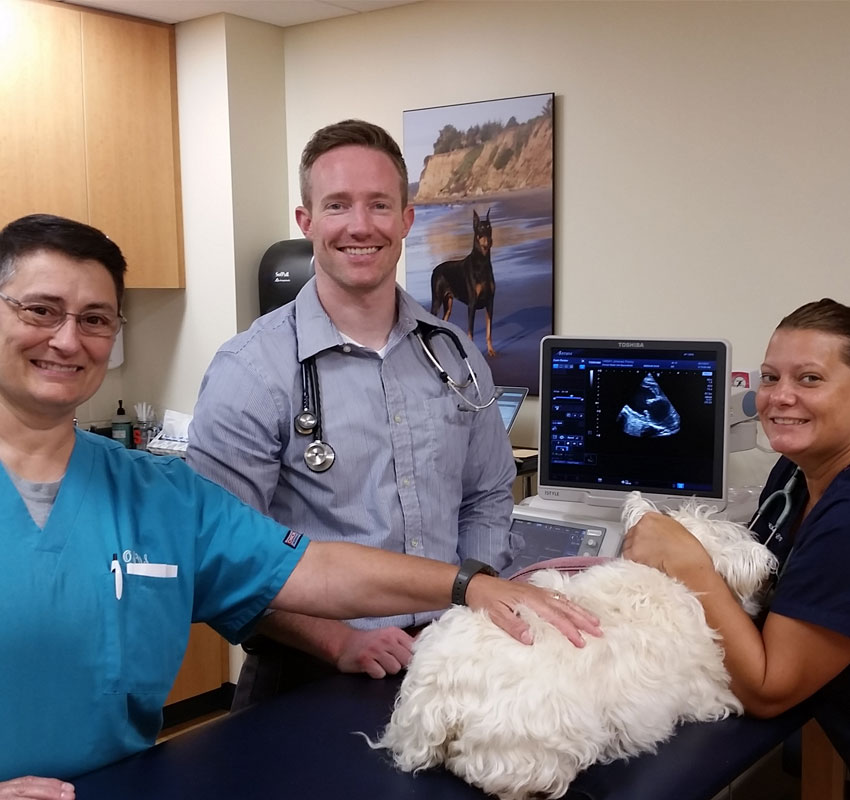Exploring the Important Services Offered by a Vet Cardiologist: Understanding Ultrasound and CT Scan Strategies
Vet cardiologists play a vital duty in the wellness of family pets by identifying and treating various heart problems. They use advanced imaging techniques, such as heart ultrasound and CT scans, to give precise analyses. Each technique has its distinct benefits and applications. Comprehending these techniques is essential for pet dog proprietors looking for the most effective care for their buddies. What factors should animal owners take into consideration when picking between these diagnostic devices?

The Duty of Vet Cardiologists in Pet Dog Health Care
Veterinary cardiologists play a crucial duty in the medical care of pets, focusing particularly on detecting and treating heart-related conditions. They possess specialized training that enables them to translate complicated analysis examinations and recognize various cardiovascular problems. These experts use sophisticated techniques, such as echocardiography and electrocardiography, to assess heart feature and structure accurately.Veterinary cardiologists likewise create tailored therapy strategies that might consist of medicines, lifestyle adjustments, and, in some situations, surgical interventions. Their competence reaches informing animal owners regarding heart health and wellness, highlighting the significance of regular check-ups and early detection of possible troubles. Partnership with general veterinarians is vital, as it assures detailed treatment for family pets with presumed cardiac problems. By offering specialized solutions, vet cardiologists greatly enhance the lifestyle for pet dogs and give assurance for their owners, reinforcing the relevance of heart health and wellness in total family pet wellness.
Common Cardiac Concerns in Animals
Common heart issues in pet dogs can considerably impact their health and lifestyle. Heart whisperings, numerous types of cardiomyopathy, and congenital heart flaws are among one of the most widespread problems that veterinarians run into. Cancer Veterinary Near Me. Comprehending these problems is necessary for pet proprietors to ensure prompt diagnosis and ideal treatment
Heart Murmurs in Pets
Although heart murmurs can be a resource of concern for family pet proprietors, they are not always a measure of serious health and wellness concerns. A heart murmur is an irregular audio produced by unstable blood circulation within the heart. In pets, these murmurs can be brought on by numerous factors, including congenital heart flaws, shutoff issues, or even anxiety throughout examinations. Several pets with heart murmurs lead normal lives without considerable wellness influences. To determine the underlying cause, veterinary cardiologists frequently utilize diagnostic techniques such as echocardiograms and Doppler ultrasounds. Early detection and evaluation are necessary, as they might help manage any potential cardiac concerns effectively. Pet owners are encouraged to consult their vet for a complete analysis if a heart whispering is identified.
Cardiomyopathy Kind Explained
Cardiomyopathy incorporates a team of conditions influencing the heart muscle mass, causing jeopardized heart function in animals. The most common kinds consist of dilated cardiomyopathy (DCM), hypertrophic cardiomyopathy (HCM), and restrictive cardiomyopathy (RCM) DCM primarily impacts dogs, causing the heart to damage and expand, which decreases its ability to pump blood effectively. On the other hand, HCM is more widespread in pet cats, identified by the thickening of the heart walls, usually causing obstructed blood flow. RCM, though less typical, happens when the heart muscle comes to be stiff, restricting its ability to fill with blood. Each kind provides unique obstacles in diagnosis and therapy, requiring specialized veterinary cardiological evaluation to ensure peak management and take care of affected pet dogs.
Hereditary Heart Flaws
Genetic heart flaws stand for a considerable group of cardiac concerns in animals, distinctive from obtained problems such as cardiomyopathy - CT Scans For Animals. These issues are structural problems present at birth, influencing the heart's normal function. Usual types consist of patent ductus arteriosus, ventricular septal flaws, and pulmonic constriction. Symptoms may differ extensively, ranging from light to severe, and can include workout intolerance, coughing, and difficulty breathing. Early diagnosis with advanced imaging methods like ultrasound is essential for efficient monitoring. Veterinary cardiologists play a crucial duty in identifying these conditions and suggesting ideal treatment choices, which might include clinical management or surgical treatment. Identifying congenital heart problems permits much better outcomes and enhanced high quality of life for impacted pet dogs
Understanding Heart Ultrasound: How It Functions
A substantial variety of vet methods currently make use of heart ultrasound as an important diagnostic device for assessing heart health and wellness in pets. This non-invasive method utilizes high-frequency acoustic waves to develop photos of the heart's framework and function. During the procedure, a veterinary professional uses a gel to the pet's upper body and uses a transducer to give off ultrasound waves. These waves jump off the heart and bordering frameworks, creating real-time photos on a monitor.Veterinarians get more can assess numerous facets of cardiac health, including chamber dimension, wall motion, and shutoff feature. Furthermore, cardiac ultrasound permits the detection of abnormalities such as liquid buildup and hereditary heart problems. This technique is vital for detecting problems that may not be visible through standard radiographs. By giving thorough info about the heart's makeup and efficiency, cardiac ultrasound help in developing efficient therapy plans for animals struggling with cardiovascular disease.
The Value of CT Checks in Identifying Heart Conditions
Just how do CT scans improve the diagnosis of heart disease in veterinary medication? CT scans offer detailed cross-sectional photos of the heart and bordering structures, enabling veterinarians to picture complex anatomical partnerships. This imaging method is specifically valuable in determining genetic heart problems, cardiac lumps, and abnormalities in capillary. By utilizing advanced imaging formulas, CT scans can assess heart chamber dimensions and feature, offering a thorough view that may be tough to achieve with standard methods.Additionally, CT angiography can visualize blood circulation and recognize areas of constriction or blockage, which is necessary for planning prospective interventions. The speed and accuracy of CT scans also assist in fast diagnoses, crucial in emergency situation situations. Ultimately, the incorporation of CT scans right into vet cardiology substantially boosts the precision of medical diagnoses, enabling targeted treatment strategies and improving individual end results for animals dealing with heart disease.
Comparing Ultrasound and CT Scan Methods
While both ultrasound and CT scans are invaluable tools in veterinary cardiology, they use distinctive advantages and limitations that influence their use in detecting heart disease. Ultrasound, or echocardiography, provides real-time imaging of the heart's framework and feature, permitting vets to evaluate heart chambers, valves, and blood flow. It is especially effective for examining problems like congestive heart failing and cardiomyopathy. Nonetheless, ultrasound might be restricted in imagining specific anatomical structures as a result of person dimension or obesity.In comparison, CT checks deal detailed cross-sectional photos of the heart and surrounding cells, making them optimal for determining structural irregularities, growths, or vascular issues. CT scans give complete insights, they call for sedation and may entail radiation direct exposure. Ultimately, the option between ultrasound and CT checks depends upon the particular medical scenario, the person's problem, and the info needed for an exact medical diagnosis.
Treatment Alternatives Offered With Vet Cardiology
Veterinary cardiology supplies a variety of therapy choices tailored to attend to various heart problems in animals. Therapy plans often begin with way of living adjustments, consisting of diet plan adjustments and exercise changes, focused on boosting overall heart health and wellness. Medications play a crucial role, with cardiologists recommending drugs such as diuretics, beta-blockers, and ACE inhibitors to enhance and take care of signs heart function.In much more serious situations, interventional treatments, such as balloon valvuloplasty or stent positioning, may be needed to alleviate clogs or improve blood circulation. For particular genetic heart problems, medical alternatives might be explored to remedy architectural issues. Furthermore, continuous monitoring and follow-up care are crucial components of an extensive therapy strategy, allowing for prompt changes based on the pet dog's response to therapy. In general, veterinary cardiology concentrates on supplying reliable, customized like maximize the health and health of pet people with heart disease.
How to Prepare Your Pet for a Cardiac Assessment
Preparing an animal for a cardiac assessment is necessary to guarantee accurate results and a smooth procedure. Proprietors need to initially schedule the appointment with the veterinary cardiologist and go over any type of certain demands or issues. It is recommended to keep food for at least 12 hours prior to the evaluation, as this helps enhance imaging quality throughout treatments like ultrasound or CT scans.Additionally, keeping a tranquil atmosphere on the day of the appointment can help in reducing the pet dog's anxiousness. It is valuable to bring along any kind of pertinent clinical records, including previous examinations and medicines (CT Scans For Animals). Proprietors ought to likewise make sure that More about the author their animal is comfortable and leashed throughout transport to the clinic. Ultimately, acquainting themselves with the assessment procedure can ease worries and aid in asking notified inquiries during the consultation. By following these actions, owners can contribute greatly to the effectiveness of the cardiac evaluation
Often Asked Concerns
For how long Does a Heart Ultrasound or CT Check Take?
The duration of a cardiac ultrasound normally ranges from 30 to 60 mins, while a his comment is here CT check may take roughly 15 to 30 mins. Elements such as the person's condition can influence these time estimates.

Exist Any Risks Related To These Analysis Treatments?

Can I Keep With My Animal During the Procedure?
The veterinary center's policy generally dictates whether pet proprietors can continue to be throughout treatments. While some centers motivate owner presence for convenience, others might need separation to guarantee safety and security and ideal problems for diagnostic imaging.
Just how much Do These Analysis Examinations Normally Price?
The costs of analysis tests, such as ultrasound and CT scans, generally differ based on location and center. Usually, prices vary from a few hundred to over a thousand bucks, reflecting the complexity and modern technology included.
What Is the Recovery Refine After a Cardiac Analysis?
The healing process after a heart evaluation entails keeping an eye on the pet for any immediate reactions, guaranteeing convenience, and limiting physical task. Vets commonly supply post-evaluation instructions to assist pet proprietors throughout this vital recovery period. Heart whisperings, various kinds of cardiomyopathy, and hereditary heart issues are among the most common problems that veterinarians run into. A heart murmur is an irregular audio produced by unstable blood flow within the heart. Cardiomyopathy incorporates a team of diseases impacting the heart muscle, leading to compromised heart feature in pets. Hereditary heart flaws represent a substantial category of cardiac problems in pet dogs, distinct from acquired conditions such as cardiomyopathy. Ultrasound, or echocardiography, gives real-time imaging of the heart's framework and function, allowing vets to evaluate heart chambers, valves, and blood circulation.